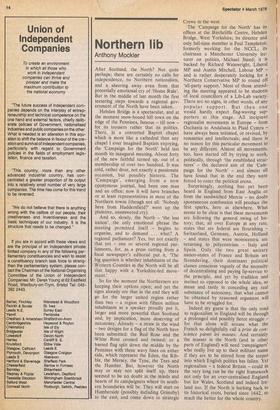Northern lib
Anthony Mockler
After Scotland, the North? Not quite perhaps; there are certainly no calls for independence, no Northern nationalists, and a sheering away even from that potentially emotional cry of 'Home Rule'. But in the middle of last month the first teetering steps towards a regional government of the North have been taken.
Hebden Bridge is a spectacular, and at the moment snow-bound hill town on the edge of the Pennines, famous — till now — for its trousers rather that its politics. There, in a converted Baptist chapel which is more like a cathedral than any chapel I ever imagined Baptists enjoying, the 'Campaign for the North' held last month its inaugural meeting. About forty of the new faithful turned up, out of a membership of over two hundred. It was cold, rather dour, not exactly a passionate occasion, but possibly historic. The 'Campaign', emerging from a now eponymous journal, had been one man and an office: now it will have branches or at least representatives in most of the Northern towns (though not all: 'Nobody here from Huddersfield?' went up the plaintive, unanswered cry).
And so, slowly, the North — 'the lost nation', the only emotional phrase the meeting permitted itself — begins to organise, and to demand ... what? A regional parliament? Yes, but not exactly that yet — one or several regional parliaments, for, as a press cutting from a local newspaper's editorial put it, 'The big question is whether inhabitants of the Western Counties in the North will be all that happy with a Yorkshire-led movement.'
So for the moment the Northerners are keeping their options open; and yet the signs already are that in the end they will go for the larger united region rather than two — a region with fifteen million inhabitants as a speaker proudly put it, larger and more powerful than Scotland and, by implication, more deserving of autonomy. Already — a straw in the wind — two designs for a flag of the North have been submitted: the Red Rose and the White Rose crossed and twined; or a barred flag split down the middle by the Pennines with three wavy lines on either side, which represent the Eden, the Ribble, the Mersey, the Tyne, the Tees and the Humber. But, however the North may or may not split itself up, there seemed to be no doubt in the minds and hearts of its campaigners where its southern boundaries will be. They will start on Humberside (possibly including Grimsby) to the east, and come down to strategic
Crewe in the west.
The 'Campaign for the North' has its offices at the Birchcliffe Centre, Hebden Bridge, West Yorkshire; its director and only full-time member is Paul Templeton, formerly working for the NCCL; its chairman a Manchester University lec
turer on politics, Michael Steed; it is backed by Richard Wainwright, Liberal MP and Austin Mitchell, Labour MP — and is rather desperately looking for a Northern Conservative MP to round off 'all-party support.' Most of those attending the meeting appeared to be students of local councillors of a Lib-Lab variety. There are no signs, in other words, of any popular support. But then one would hardly expect flag-waving supporters at this stage. All incipient regionalist movements in Europe — from Occitania to Andalusia to Plaid Cymru — have always been initiated, or revived, by romantics and intellectuals; and there is no reason for this particular movement to be any different. Almost all movements, too, have started off by trying to work, politically, through 'the established structures' — the declared aim of the 'Campaign for the North' — and almost all have found that in the end they were forced to enter the political arena.
Surprisingly, nothing has yet been heard in England from East Anglia or from the sandwiched Mercia — no doubt spontaneous combustion will produce the first sparks, here as elsewhere. What seems to be clear is that these movements are following the general swing of history; that, all over Europe at any rate, states that are federal are flourishing — Switzerland, Germany, Austria, Holland — and states that were monocentric are returning to polycentrism — Italy and Spain. Only the two great unitary nation-states of France and Britain are floundering, their dominant political
classes conscious vaguely, of the necessity of decentralising and paying lip-service to the principle, and yet by tradition and instinct so opposed to the whole idea, so mean and tardy in conceding any real substance of autonomy, that what cannot be obtained by reasoned argument. will have to be struggled for.
Indeed my guess is that the only road to regionalism in England will be through a prolonged and possibly fierce struggle —
for that alone will arouse what the French so delightfully call a prise de conscience parmi les masses. And certainly the masses in the North (and in ether
parts of England) will need 'campaigners' who really live up to their militant name if they are to be stirred from the torpor into which English politics has fallen. Yet
regionalism — a federal Britain — could in the very long run be the right framework
not only for an over-centralised England but for Wales, Scotland and indeed Ireland too. If the North is harking back to its historical roots, buried since 1642, so much the better for the whole country.


































 Previous page
Previous page